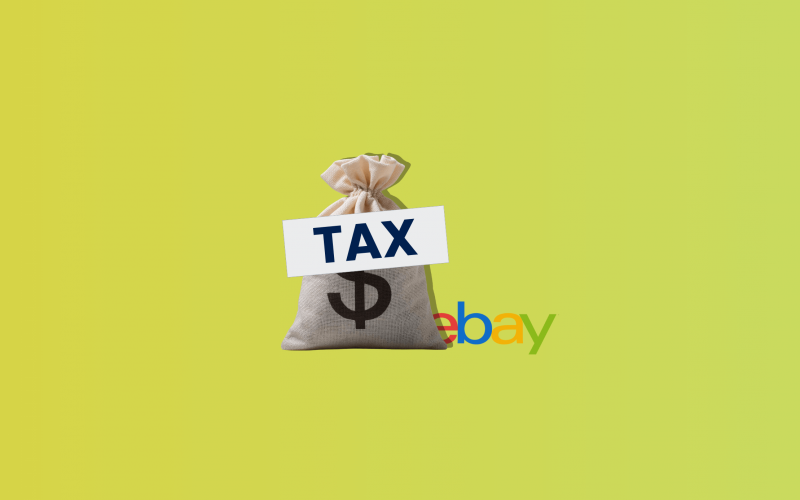eBay is a very special platform where you can list the most amusing items, among other products. Confetti from a K-pop band’s concert or a nugget shaped like an animal—you name it and the chances are, you’ll find it. However, behind those interesting goods, there’s the practical necessity of managing your finances and recording your sales accurately and meticulously. Managing that money will most often lead to taxes.
One of the most common forms of tax that an online business needs to be aware of is income tax. With the IRS rules and recent legal changes, there’s more to this story.
At Synder, we understand the complexities that eBay sellers face when managing their sales, expenses, fees, and taxes— for the past 6 years, we’ve been making software that does exactly that. And in this article, we’ll share our expertise and offer insights on how to best manage your online sales, so that your taxes can be accurately reported.
TL;DR
- Track all your eBay transactions to ensure you report income correctly and comply with IRS guidelines.
- eBay sales can be classified as business, hobby, or an occasional ‘yard and garage’ online sale, affecting how they’re taxed.
- You need to file correct tax returns based on your eBay business entity type.
- Always seek expert advice for accurate tax calculations and compliance with evolving legal and tax requirements.
Contents:
1. What type of taxes do I need to pay when selling on eBay?
2. How does the income tax on profits from ecommerce sales work?
3. How do your eBay sales affect income tax?
4. How to accurately record your eBay transactions in your books?
5. What is Form 1099-K and how does it relate to your ecommerce business?
6. Does eBay report online sales to the IRS?
7. What are the tax reporting thresholds?
8. What if you fall below the reporting threshold?
9. What happens if you have multiple accounts?
10. Can eBay apply backup withholding?
11. How to report your sales if you’re a business?
12. How to file when you have hobby sales?
What type of taxes do I need to pay when selling on eBay?
There are different types of taxes that ecommerce business owners must be aware of. Selling on eBay can incur the following ones:
- Income tax;
- Tax on items bought and sold on eBay;
- Tax on eBay fees (depending on the country this can be VAT, GST, etc.,).
As a seller, you might pay them all or even none, which depends on many factors. That’s why to get tailored tax advice for your specific business situation, it’s always best to consult an ecommerce tax expert.
How does the income tax on profits from ecommerce sales work?
As an eBay seller, you pay income tax on your profits, which are your total sales minus any costs like product costs and eBay fees. The more you earn, the more tax you might pay. It’s necessary to keep track of all your sales and expenses because you can reduce your taxes with valid deductions.
In the later section, we’ll show you how automated bookkeeping can help you lower that tax bill and stay on top of your business operations.
How do your eBay sales affect income tax?
It’s safe to say that not all eBay sales are subject to income tax. This, however, depends on several factors. We will start with the first one – the sales category.
Generally, there are 3 categories that your eBay sales can fall into:
- Occasional ‘yard or garage’ online sales;
- Hobby sales;
- Business sales.
Let’s review them all, one by one.
Occasional ‘yard or garage’ online sale
If you’re using eBay as you would an occasional yard or garage sale, usually the proceedings from those sales aren’t considered taxable income. One reason is that it happens occasionally. The second one is that with garage and yard sales, you’re selling used items for less than you bought them and probably even for less than their worth. Hence, it isn’t done to make a profit but mostly to just clear up some space in your storage.
That’s why, if you meet those criteria with your online sales on eBay, they shouldn’t be considered taxable.
Selling for profit: Hobby vs. business
Generally, there are two different designations for selling for a profit on eBay — hobby sales and business sales. The IRS uses some of the following criteria to help determine which of the groups an individual might fall under:
- The amount of annual sales transactions;
- Total gross sales from transactions;
- Dependency on this source of income:
- The number of hours spent selling on the platform.
The IRS has a more exhaustive list of conditions that it takes into account when determining whether sales should be classified as a hobby or as a business. So check out their information for a fuller picture.
So both hobby sales and business sales are taxable income that needs to be reported to the IRS. However, different filing rules apply to each type.

How to accurately record your eBay transactions in your books
Especially if you sell on eBay as a business, recording every transaction accurately is a must. You can lower your tax income in many ways, and it all starts with good bookkeeping.
Synder knows precisely how ecommerce bookkeeping works and provides the tools you need to track every sale, expense, and tax deduction.
Did you know that Synder tracks every eBay fee, as well as fees from other sales channels, marketplaces, and payment gateways, which you can deduct from your taxable income?
Synder is a financial management software that automates the recording of eBay transactions, including sales, fees, expenses, discounts, taxes, and much more, directly into these accounting software:
- QuickBooks Online;
- QuickBooks Desktop;
- Xero;
- Sage Intacct.
If you run a multi-channel business, also selling on Amazon, Etsy, Shopify, and TikTok (or other sales channels), and process your payments through PayPal, Stripe, Afterpay, or even some POS systems – we integrate it all, and more. We have over 30 integrations and we take requests from our clients for new ones too.
Now, let’s explore how we address the key challenges in managing eBay transactions.
Automatically managing ecommerce transactions and taxes
Synder automatically syncs all your online transactions straight into the right accounts in your books and offers many features like one-click reconciliation, financial statements, ecommerce KPIs, and more.
Here, we’ll zoom in on Synder’s tax capabilities for managing taxes.
Marketplace facilitator tax
Marketplace facilitator laws require platforms like eBay, Amazon, Walmart, or Etsy to collect and remit sales tax on sales made by third-party sellers through their platforms.
The issue here is – sellers need to record this tax in their books even if it was paid by the marketplace.
Synder automatically records the sales tax collected and remitted by the marketplace. It also helps sellers differentiate between taxes they need to handle directly and those handled by the marketplace.
Generic and default tax code settings
To help manage your tax, Synder also has tax code settings that automate how taxes are applied to your eBay sales transactions. We offer two main categories:
- Generic tax codes: These are standard tax rates that you can set up in Synder to apply to most of your transactions. This means whenever a sale occurs, Synder automatically uses these generic rates to calculate the tax, saving you the time and effort of doing it manually for each transaction.
- Default tax codes: These are the rates that Synder will automatically use if no other specific tax information is provided for a transaction. It’s like a fallback option to ensure that every sale has some form of tax applied, according to the default settings you’ve established.
These features make it easier for you to manage sales taxes without having to enter tax details for every transaction manually, ensuring consistency and reducing errors in your financial records.
Expense tax settings
Synder also includes functionality for managing taxes on expenses, not just sales. This feature is quite useful for keeping accurate financial records, particularly when it comes to tax deductions and compliance.
You can set different tax rates for various kinds of expenses using Synder, based on the specific tax laws where you live or the type of expense it is. This flexibility is really helpful for businesses that have many different types of costs, as each type might need a different tax rate applied to it.
If you’re interested in a life session about Synder’s capabilities, book a seat at our Weekly Public Demo or opt for a 15-day free trial to experience Synder’s functionality first-hand.
What is Form 1099-K and how does it relate to your ecommerce business?
If we want to talk about eBay sales, we need to talk about Form 1099-K (Payment Card and Third Party Network Transactions). This tax form is used to report income received through payment cards (like credit and debit cards) and third-party payment networks. If you’re an eBay seller and you receive payments for your sales through these methods, you might get a Form 1099-K.
This form is important for eBay sellers because it shows the total gross amount of all transactions without subtracting any fees or refunds. The IRS uses it to make sure that sellers are reporting all of their income accurately on their tax returns.
On your side, the information on Form 1099-K will help file your tax returns, ensuring all your income from online sales is reported correctly.
Does eBay report online sales to the IRS?
eBay has a responsibility to report your sales to the IRS when you cross over the threshold of sales. Moreover, both the federal threshold and state thresholds for reporting are reported and tracked by eBay. So if you don’t fall under the IRS threshold for annual sales, but you do according to your state regulations, eBay will report your sales and send you the Form 1099-K. But that’s not the whole story – there are new rules that are coming to sellers changing the reporting thresholds.
What are the tax reporting thresholds?
With the American Rescue Plan (ARP) there are changes to tax reporting requirements for individuals and businesses, particularly affecting those who conduct transactions through online platforms, including eBay sellers.
As said above, eBay and other marketplaces like Amazon, Walmart, or Etsy have to report online sales to the IRS. The IRS keeps extending the transition period and so far the old rule is still in place. This decision was made to reduce confusion and allow more time for taxpayers and tax professionals to adjust to the new reporting requirements.
The old rule (still applicable): If you had gross sales of more than $20,000 and you’ve completed at least 200 transactions on the platform, then you’ll typically be classified as a business and eBay will send you the Form 1099-K.
The new rule (not applicable yet): The reporting threshold will be lowered to just $600 in total payments, with no minimum transaction number.
The IRS is considering a phased approach and plans to set the threshold at $5,000 for the 2024 tax year as part of this transition before fully implementing the $600 threshold. However, these are only plans by the IRS and nothing is set in stone.
Synder partners with some great accounting professionals, so if you’re looking for advice on your specific situation or are interested in full service accounting, check out our Accountants Directory.
What if you fall below the reporting threshold?
If you don’t reach the threshold for eBay sales, it doesn’t mean you’re exempt from reporting your income to the IRS.
It’s still a legal requirement to report all income from your eBay sales on your tax return, regardless of whether you receive a Form 1099-K or not. This includes any amount, even if it’s below the threshold.
What happens if you have multiple accounts?
If you use multiple eBay accounts linked to the same Social Security Number (SSN) or Individual Taxpayer Identification Number (ITIN), all your sales from these accounts are added to determine if you meet the tax reporting thresholds.
If your total sales across all accounts exceed these limits, you’ll receive a Form 1099-K for each account, even if some of the accounts individually don’t meet them.
Can eBay apply backup withholding?
In certain situations, eBay is required by the IRS to withhold 24% tax on payments eBay makes, known as backup withholding. Usually, it’s due to failure to provide a valid TIN to eBay. To avoid it, sellers must provide eBay with your full 9-digit TIN (SSN, EIN, or ITIN). Here you’ll find a full list of conditions under which the IRS decides to apply backup withholding.
Once you receive the Form 1099-K, you can check the amounts for federal and state backup withholding in the appropriate sections.
To check backup withholding on any payments, see the ‘All Transactions’ page on your Seller Hub and open transaction details.
How to report your sales if you’re a business
As a business, you have more tax advantages compared to being classified as a hobby. For example, you can deduct your business expenses and losses from your income, which can reduce the amount of tax you owe.
Passed-through taxation and how it affects your reporting
In the US, you pay your income taxes differently depending on the type of business entity you have. It can get passed through your personal income tax or be treated as separate corporate income, depending on how your business is structured.
Apart from C corporations, all other business entities (sole proprietorships, partnerships, LLCs, and S corporations) have their business income passed through to their personal income tax filings. This system simplifies the tax process but also means that individual owners must be aware of their tax obligations on these earnings.
Below we’ll break down each type of business entity in simple terms along with the right reporting form.

1. Sole proprietorship
If you’re a sole proprietor, you report what you earn and spend on eBay on a part of your personal tax form called Schedule C. This helps figure out how much profit you made after expenses, and that number goes on your main tax return (Form 1040).
2. Partnership
In a partnership, the business doesn’t pay taxes itself. Instead, each partner reports their share of earnings on their own tax forms. You’ll get a form called Schedule K-1 that tells you what to report and how to file your tax return.
3. Limited liability company (LLC)
It might surprise you, but an LLC isn’t recognized as a separate tax entity by the IRS. So, LLCs can pick how they want to be taxed: just like if you’re working alone, with partners, or as a corporation.
Follow the rules for whichever setup you choose (see above for sole proprietorship and partnership).
If you choose to be taxed as a corporation, you’ll report like a small corporation (S Corp) or a big corporation (C Corp), described next.
4. S Corporation (S Corp)
You’ll file a special form for small corporations (Form 1120-S). The business’s earnings are passed along to you and other owners to report on your personal taxes. You’ll get a Schedule K-1 to help with that.
5. C Corporation (C Corp)
The corporation files its own, separate tax return (Form 1120) and pays taxes on its profits. If you get dividends (a share of the profits), you’ll report and possibly pay taxes on those on your personal tax return forms.
How to file when you have hobby sales?
If you’re selling goods as a hobby, the way you report your eBay income to the IRS is a bit different from how a business would. Two major differences are:
- You won’t receive the 1099-K Form from eBay;
- You can’t deduct your expenses and losses associated with the hobby sales.
Hobby income should be reported on your personal tax return using Form 1040. Under the current tax law (Tax Cuts and Jobs Act), you can’t deduct expenses associated with your hobby. This means all your income from the hobby is taxable, and you can’t reduce that income by the costs you incur while conducting the hobby.
Even though you can’t deduct these expenses, it’s still good practice to keep detailed records of both your income and expenses. These records can be useful for tracking your financial activities and are essential should the IRS question your reported hobby income.
Closing thoughts
eBay sales do affect your income tax in the US if they’re considered taxable income (for profits from your business and hobby sales). That’s why it’s important to maintain accurate records of your sales, expenses, and any other relevant information to ensure you comply with all tax regulations.
At Synder, we know just how complex ecommerce bookkeeping can be and what solutions we need to offer our clients to help them combat these challenges.
If you’re interested in Synder software and would like to know more about our functionalities, you can also sign up for our webinars which are tailored specifically to business owners.
This article has been prepared for information purposes only and gives a general overview of income tax when selling on eBay. It isn’t intended to provide any tax advice. It’s always best to consult with and seek the service of a tax professional to ensure that taxes are properly calculated and reported. For complex matters, consider expert legal advice that can guarantee that your specific circumstances are handled correctly and in compliance with current laws and regulations.
Share your experience
Let us know in the comments about your experiences or advice. What online service provider has made a difference in your online business? Did any software stand out as a full service solution? Your insights can help other sellers understand the challenges and strategies for managing taxes effectively in an ecommerce setting.







Thanks for the article! didn’t know about this effect of Ebay sales on my taxes.
Hi David, we’re glad you found this article helpful.
Thank you for adding the information about hobby income and the expenses as related to how they can be taxed with the IRS. I did not know that before now. I see this area becoming tighter and tighter as time goes by and online sales become a bigger part of everybody’s shopping.